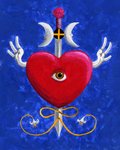What is Voodoo?
- Voodoo (or Voudoun, Vodou, Vaudoun, Vadu) is an religion based on the beliefs of Africans brought from West Africa to Haiti as slaves. The religion has mixed or syncretized with western traditions including Catholicism. I use "Voodoo" rather than the other forms because that is the American spelling and I'm most interested how "serving the spirits" has moved from Africa to Haiti to the USA and beyond. I agree with using a more Haitian spelling when discussing the religion as practiced in Haiti. Usually Vodou, Voudoun, or Vaudoun is used.
Until I write something more, check out The Vodoun Information Pages--an excellent source for more information about Voodoo. I have started a Baron Samedi page with some very basic information and some cool images. There is also Voodoo-L, a mailing list about Voodoo. This lively discussion list discusses Voodoo from many perspectives. Mambo Racine Sans But is one participant with her own Web page.
- Again, I need to get writing, until then, see The New Orleans Voodoo Spiritual Temple According to their FAQ, some differences between New Orleans and Haitian Voodoo include the use of live snakes in rituals and the reverence of Dr. John and Marie Laveau, sometimes as highly as loa. On my last trip to N.O. I spoke with people at Island of Salvation botanica, F & F Candle, and the Spiritual Voodoo Temple. I have photos of F & F and Isle of Salvation. All three were very friendly and helpful. I've had Priestess Miriam at the Spiritual Temple do a reading and was very impressed. The timing didn't work out this last trip—but there's always next time.
- Island of Salvation Botanica
- 835 Piety Street
- New Orleans, LA 70117
- 504/948-9961
- Voodoo Spritual Temple
- 828 N. Rampart Street
- New Orleans, LA 70116
- 514/522-9627
- F & F Candle
- 801 N. Broad Street
- New Orleans, LA 70119
- 504/482-9142
| | | |
My perception is that current Voodoo practices in New Orleans range from candle, herb, and oil hoodoo, to full-scale Voodoo religious rituals. Many Santeria and European elements have been incorporated and practicioneers come from all races and ethnic groups. For example, F & F Candle effectively combines Latin and African traditions. Ava Kay Jones leads the Voodoo Macumba Dance Ensemble in New Orleans and claims both the Voodoo and the Yoruba traditions. Isle of Salvation calls itself a "botanica," traditionally a term used for a Santeria herb and spritual supply store.
This kinds of leads into the question of differences and similarities between the various African-Caribbean religious traditions. There really is no clear A in Voodoo = B in Santeria = C in Africa = D in Catholicism kind of chart. Maya Deren has a good "rough" of different Voodoo loas and their origins. If you also read the Gonzalez-Wippler you'll find a santos/saint comparison. By combining the two, plus using other sources, you can come up with some very general comparisons.
- Voodoo and Santeria are both African-based religions adapted and, to varying degrees, syncretized with Catholicism. Both religions used images Catholic saints to represent the African gods, loas, or santos. Sometimes more than just the images are used and a true meld or syncretism occurs. Depending on your viewpoint, you may see the combining of African tradition with Native Caribbean and Catholic religion as something new, invigorating, and well-adapted to Haiti or Cuba (and even the United States). You may also see it as merely a corruption of the "pure" African Yoruba traditions.
I've found this link on African Religious Syncretism, an article comparing Santeria, Voodoo and Macumba--favoring Santeria as more "pure" because of the use of Yoruban names and language in the religion. Interesting read. There is also a Brazilian publisher with an Orixa page in Portugese.
- Hoodoo is a folk version of Voodoo that focuses on the conjuring and herbal magic. Some wouldn't equate Voodoo with Hoodoo, but I'd have to say that hoodoo is a simplifed version of part of the Voodoo focusing on the magical. New Orleans Voodoo is a bridge between Haitian Voodoo and folk hoodoo. New Orleans Voodoo still has religious and ritual elements like Haitian Voodoo, but also puts strong emphasis on gris-gris and magic. New Orleans Voodoo seems to have been reinvigorated when the slaves in St. Dominique revolted and the slaveholders fled, many to French-speaking New Orleans.
For more info about hoodoo, see the Lucky Mojo Curio Website and read Voodoo and Hoodoo by Jim Haskins.
- There are several books about Voodoo, Santeria, Macumba, and related topics. In association with Amazon.com, we've opened a Voodoo Bookstore allowing you to quickly and easily order those hard-to-find books.
Where can I find Voodoo info on the Web?
There aren't as many references to Voodoo on the Web as you might think. Most sites are about VooDoo bikes or Jimi Hendrix, not Voodoo the religion.
The Vodoun Information Pages at:
http://www.arcana.com/voodoo/voodoo.html are an excellent source for more information about Voodoo. Note: this site now appears down.The New Orleans Voodoo Spiritual Temple now has a page at
http://www.gnofn.org/~voodooThe New Orleans Historical Voodoo Museum has a page at
http://www.voodoomuseum.comNote: this site now appears down.Join the spam-free Voodoo-L discussion group
La Guerra Negra--Voodoo from Branwen's Pantry A web business with many Voodoo items and a paper newsletter, Oshun, about Voodoo and Santeria. There are articles about Voodoo in New Orleans and Yemaya.
OrihaNet is an excellent Santeria resource online. Their address is http://www.seanet.com/~efunmoyiwa/welcome.html
Santeriahttp://www.webspinnerspress.com/3rdstone/santero.htm
The Vodun (Voodoo) Religionhttp://www.religioustolerance.org/voodoo.htm
Religion in the Carribean from NandoNethttp://www.nando.net/prof/caribe/caribbean.religions.html
Puerto Rican Santeria information is at: http://www.t0.or.at/0ntext/ldsanter.htm





No comments:
Post a Comment